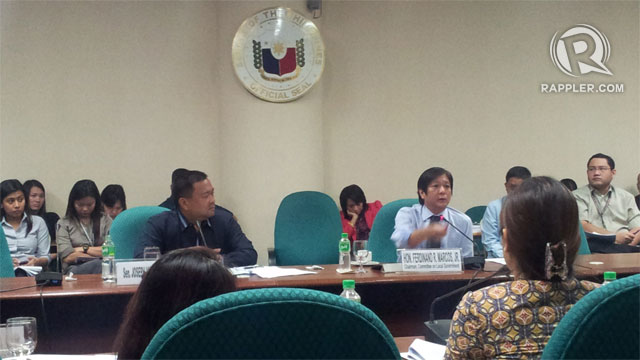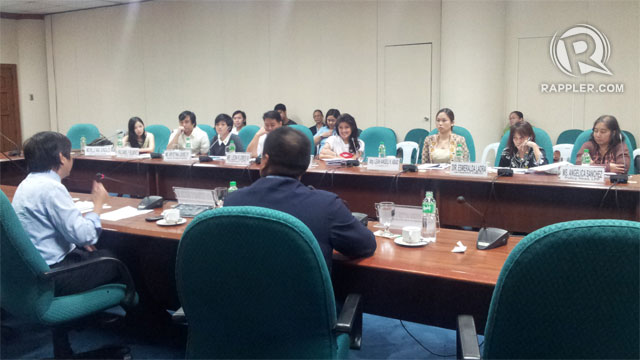SUMMARY
This is AI generated summarization, which may have errors. For context, always refer to the full article.

MANILA, Philippines – What do initial Senate deliberations on proposed reforms in the Sangguniang Kabataan (SK) tell us?
The Kabataang Barangay (KB) – which it tried to replace for being a vestige of the Marcos dictatorship – may turn out to be a better concept after all.
On Tuesday, October 1, a Senate hearing on two SK reform bills was spearheaded by Sen Ferdinand “Bongbong” Marcos Jr, chairman of the Senate local government committee. Among the resource persons was Ilocos Norte Gov. Imee Marcos, former KB chairperson and sister of Sen Marcos.
“The KB was formed [in 1975] in recognition of the zeal and capacity of the youth in nation-building,” said Governor Marcos, chairman of the KB during the time of her father President Ferdinand Marcos.
Citizenship trainings made the bulk of KB activities, she said.
Starting 1991, when the Local Goverment Code replaced it with the SK, youth projects became limited to “tree-planting, sports tournaments, and beauty pageants,” she said.
KB officials didn’t receive salaries nor handled funds, unlike the SKs who often find themselves mired in dirty elections and anomalous contracts like adult politicians.
Marcos suggested that the SK be restored as a training ground for the youth to become responsible leaders and citizens of the country.
“Ang akin, ibalik sana ang volunteerism sa ating kabataan. Walang sahod, walang bayad, walang social fund, at walang pakikilahok sa mga bank at sa mga kontrata. Ang ibigay na lamang: scholarship, Philhealth, death benefits — katulad nung aming tinatanggap noon, wala nang iba,” Governor Marcos said.
(I suggest, let’s restore the spirit of volunteerism in our youth. No salary, no payment for their services, no social fund, and no transaction with banks and contracts. Instead, let’s give them scholarships, Philhealth memberships, and death benefits – the same ones we got in KB back then, nothing else.)
The two chambers of Congress have to come up with reforms in the youth councils during the year that they have postponed the SK elections, originally scheduled for October 28 this year.

‘Youth leaders need not be young’
A major point of debate is the age range of SK participants. Currently, Filipinos aged 15 to 17 years old form the SK electorate. It was the same age bracket for KB.
Paul Daniel Belmonte, SK National Federation (SKNF) vice president for Luzon, expressed concerns that 15-to-17-year-olds are seen to be very young, and not yet in legal age to enter into contracts.
Senate Bill 68, authored by Senator JV Ejercito who was present at the hearing, seeks to change the age range to 18-24 years old.
Meanwhile, Senator Bam Aquino IV’s SB 1090 wants it to be 15-24 years old, the same as the United Nation’s definition of youth.
Commission on Elections (Comelec) chairman Sixto Brillantes Jr has earlier proposed an 18-30 age bracket. Republic Act No. 8044, which created the National Youth Commission (NYC) in 1994, even widens the youth age range to 15-30.
“You do not have to be young to be a youth leader,” said Senator Marcos.
Too young to handle funds
Age is related to another major issue about the SK: handling money.
“Since SK leaders have a vote on matters that could involve huge amounts of public funds, they are vulnerable to influence of corrupt politicians or unscrupulous contractors,” said Senator Marcos.
The Local Government Code mandates that 10% of a barangay’s internal revenue allotment (IRA) be allotted to the SK Fund. This amounts to a total of about P6.1 billion for youth councils in over 42,000 barangays nationwide.
Senator Marcos reiterated that the SK Fund should be used for solving youth-related issues, like teenage pregnancy, drug abuse, and bullying.
But SK representatives in the hearing revealed that barangay officials block the release of these funds to them. Governor Marcos suggested that the 10% be automatically given solely to the SK, sanctioning barangays that would not comply.
Another suggestion is the possible adjustment of the 10% allocation itself, due to the huge disparity of that amount between rural areas and urban cities.
Other resource persons in the Senate hearing were NYC Chairman Leon Flores III, and representatives from Comelec and the Department of the Interior and Local Government (DILG).
A second hearing will likely be scheduled to address more issues about the SK.
The Sangguniang Kabataan elections, originally synchronized with the barangay polls on October 28, has been postponed by Congress to work on reforms for the beleaguered youth council.
Senator Marcos authored the Senate version of the postponement bill.
The bicameral version of the bill, which schedules the next SK elections between Oct 28, 2014, and Feb 24, 2015, is now awaiting President Benigno Aquino III’s signature. – Rappler.com
Add a comment
How does this make you feel?
There are no comments yet. Add your comment to start the conversation.